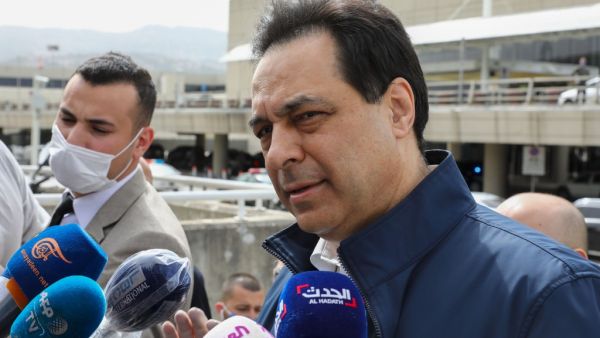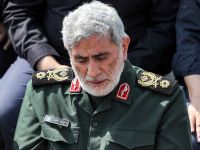Hassan Diab’s government finally resigned, six days following the tremendous blast of Beirut port that devastated part of the Lebanese capital, at a time when confrontations between protesters and security forces in the vicinity of the Parliament building ignited once again.
Lebanese political sources considered the resignation of Diab’s government a major failure for Hezbollah, the one party that the Lebanese accuse of having caused the blast because of the weapons and chemicals it keeps stored in the city’s port.
Despite the absence of any solid evidence, the Lebanese still insist on holding Hezbollah responsible for the disaster that befell Beirut, particularly in light of some Israeli rumours saying that the beginning of the conflagration started in a weapons and missiles depot then quickly spread to warehouse 12 where tons of ammonium nitrate were stored.
The explosion of 2,750 tonnes of ammonium nitrate at Beirut port, on August 4, killed at least two hundred people, wounded more than six thousand more and destroyed entire sections of the coastal city, thus exacerbating the country’s political and economic crisis of the past few months
Shortly after the explosion, Lebanese President Michel Aoun said that explosive materials had been stored insecurely for years at the port and that the investigation would determine whether the explosion was caused by an external interference or negligence or simply an accidental occurrence.
Lebanese political circles believe that Hezbollah picked up on the reaction of the Lebanese population which knows full well that the party was in full control of the port of Beirut.
Consequently, it found itself in a such an embarrassing position that it preferred to scapegoat Diab’s government and push for its resignation, at a time when everybody expected it to fight for the government’s survival for the long term as a caretaker government working for the party’s agenda.
Equally expected by Lebanese political sources is the international community’s pressure, led by France, for the formation of a new government that includes highly qualified specialists and headed by a respected figure such as Nawaf Salam, a sitting judge at the International Court of Justice, or Mohamed Baasiri, the former deputy governor of the Central Bank of Lebanon. Baasiri has America’s support, primarily due to his professionalism and to the close relationship he established with the administration in Washington.
Lebanese political sources are wondering about Hezbollah’s stance on forming a new government, expecting it to play wait-and-see for the moment in order to gauge the international pressure on President Aoun to accelerate the formation of an alternative government.
Ministerial and political sources said the government met Monday under tremendous pressure as many ministers wanted to resign. Diab’s government was formed in January, with the support of Iran-backed Hezbollah and its allies.
On Monday, Hassan Diab announced directly on television the resignation of his government, following a cabinet meeting.
Minister of Youth and Sports, Vartine Ohanian, told Agence France Presse that Diab announced his resignation prior to meeting President Michel Aoun at Baabda Palace. She explained that “during the cabinet meeting, the majority of ministers have demanded the government’s resignation,” adding that she herself “called from the first day for the government’s resignation as a result of what happened, but it had to be a collective resignation rather than on an individual basis.”
Since Sunday, four ministers tendered their resignation, overwhelmed by the horror of the Beirut port explosion. Media reports said other ministers were determined to resign, putting pressure on Diab.
The government consists of twenty ministers. Under the law, in order for the government to fall, more than a third of the cabinet members would have to resign.
At the same time, nine members of the parliament have tendered their resignations since the explosion.
Diab’s government was supposed to be mainly a government of technocrats who would be able to address and find solutions to the economic problems and living conditions of the Lebanese population, but it has become clear that decision-making in this government was held hostage by the influential political forces in the country, chief among whom were President Aoun’s movement and its ally Hezbollah.
For the majority of ordinary Lebanese citizens, the Beirut blast was the straw that broke the camel’s back in a protracted crisis caused by economic collapse, corruption, waste and mismanagement, and that is why they took to the streets demanding comprehensive changes.
Local media and a source close to Lebanese Finance Minister Ghazi Wazni said that the minister had prepared his resignation letter and brought it with him to the cabinet meeting. Wazni is one of the main negotiators with the International Monetary Fund regarding a plan to help Lebanon out of its financial crisis.
An emergency international donors conference concluded on Sunday with pledges of emergency aid worth about $ 298 million.
However, the donor countries are demanding transparency in the distribution of aid for fear of writing blank checks to a government whose own people see as mired in corruption.
Lebanese engineer Joe Haddad told Reuters that the entire system must be changed, stressing that a new government will not change the situation. He added that new elections must be held urgently in the country.
This article has been adapted from its original source.








